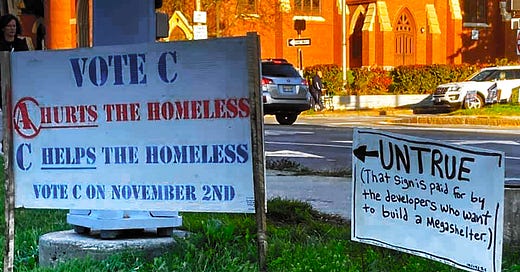Why Are Social Impact Investors Trying So Hard to Defeat Smaller Shelters for the Homeless?
"Social Impact" developers in Portland Maine seek to squelch a referendum for smaller shelters so they can build large human warehouses
In the 1970s under Governor Longley, Maine became a centrally managed economy that expanded Maine’s wealth gap and merged, almost seamlessly, the public and private and the non-profit and for-profit economic sectors into one mutually beneficial wealth-concentration & distribution system.
Currently, mutually benefitting factions are coming together once again in hopes of building a warehouse-style shelter for the homeless in a Portland, Maine industrial development district.
In addition to beds for the homeless, the project will include, dining, and locker facilities, as well as offices and an attached health clinic.
The promotion describes the facility as “a new state-of-the-art, one-story, adult Homeless Service Center Project to replace the Oxford Street Shelter.” While the plan offers health care and other services, it raises the question of why the state of the art for sheltering the homeless, planned during a pandemic, is a sleeping environment consisting of cots…
Keep reading with a 7-day free trial
Subscribe to Mackenzie Andersen's The Individual vs The Empire! to keep reading this post and get 7 days of free access to the full post archives.




